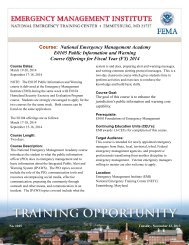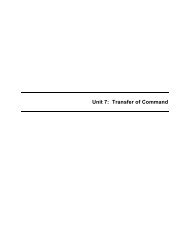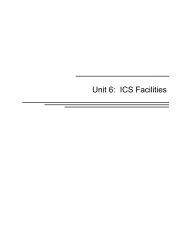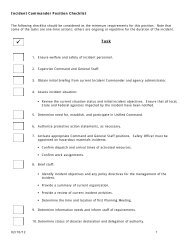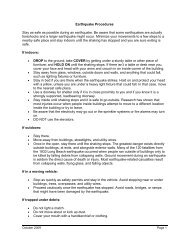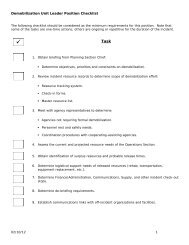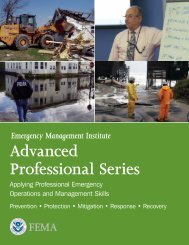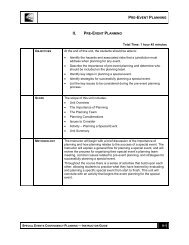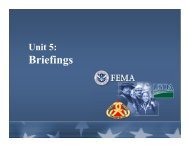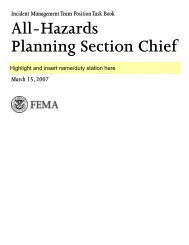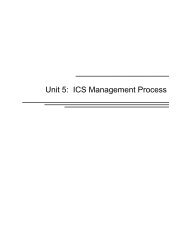enrollment for emi courses - Emergency Management Institute ...
enrollment for emi courses - Emergency Management Institute ...
enrollment for emi courses - Emergency Management Institute ...
You also want an ePaper? Increase the reach of your titles
YUMPU automatically turns print PDFs into web optimized ePapers that Google loves.
EsIDEnt cOursEs—<br />
prEparEDnEss &<br />
tEcHnOlOgy<br />
EmE r g E n c y ma n a g E m E n t In s t I t u t E • 2010-2011 • ca t a l o g of co u r s E s<br />
radiological <strong>Emergency</strong> preparedness<br />
(rEp) Exercise Evaluation (non-resident)<br />
regional Delivery (l304)<br />
This course is <strong>for</strong> Federal evaluators of nuclear<br />
power plant off-site exercises. Course topics include<br />
regulations and guidelines <strong>for</strong> evaluating exercises<br />
and the techniques <strong>for</strong> exercise evaluation.<br />
Selection Criteria: Primarily Federal evaluators of<br />
nuclear power plant off-site REP exercises. State, local,<br />
Tribal, and utility personnel who are involved in the<br />
development of off-site REP plans and exercises also<br />
may apply.<br />
Prerequisites:<br />
Required: IS 331, Introduction to Radiological <strong>Emergency</strong><br />
Preparedness (REP) Exercise Evaluation.<br />
ACE Recommendation:<br />
Credit Hours: 2 hours<br />
Level: G or UD<br />
Curricula: Radiological Sciences, Public<br />
Administration<br />
Course Length: 3 days<br />
CEUs: 1.8<br />
radiological <strong>Emergency</strong> preparedness<br />
(rEp) planning (E/l340)<br />
This course focuses on nuclear power plant offsite<br />
emergency preparedness. It addresses Federal<br />
regulatory policies, development and testing of<br />
plans, and public perceptions. This course provides a<br />
sound understanding of basic planning assumptions<br />
and policy issues.<br />
Selection Criteria: Local, State, Federal, and Tribal<br />
government and utility personnel involved in<br />
off-site nuclear power plant emergency planning<br />
(under the provisions of Nuclear Regulatory Guide<br />
(NUREG) 0654/FEMA REP 1, Criteria <strong>for</strong> Preparation<br />
and Evaluation of Radiological <strong>Emergency</strong> Response Plans and<br />
Preparedness in Support of Nuclear Power Plants). This course<br />
FEd E r A L Em E r g E N C y mA N A g E m E N T Ag E N C y 38<br />
is recommended <strong>for</strong> new Federal/State/local/<br />
Tribal REP planners and Federal/State/local/Tribal<br />
emergency response managers. Utility company offsite<br />
planners also may apply.<br />
Prerequisites:<br />
Recommended: Completion of IS 235, <strong>Emergency</strong><br />
Planning.<br />
ACE Recommendation:<br />
Credit Hours: 2 hours<br />
Level: UD<br />
Curricula: Radiological Sciences, Public<br />
Administration<br />
Course Length: 4 days<br />
CEUs: 3.1<br />
radiological accident assessment<br />
concepts (raac) (E341)<br />
This course addresses radiological consequences<br />
of accidents involving radiological materials.<br />
This includes accidents or incidents involving<br />
commercial power reactors, lost sources, dispersion<br />
devices, and transportation. The focus of the course<br />
is concepts involved in <strong>for</strong>mulating protective action<br />
recommendations following a radiological accident,<br />
such as dose quantities, atmospheric dispersion,<br />
dose projection, protective action guides, and<br />
derived intervention levels. Participants engage in<br />
problem-solving sessions and a tabletop exercise.<br />
There are two required evening sessions and a<br />
final examination in this course.<br />
Selection Criteria: Enrollment is limited to local, State, and<br />
Federal technical radiological accident assessment staff.<br />
Private sector (i.e., utility company) technical staff also<br />
may apply. This course is not intended <strong>for</strong> emergency<br />
management staff. This course requires familiarity<br />
with mathematical equations and exponential<br />
manipulations. Participants must bring a scientific<br />
calculator which they know how to use to per<strong>for</strong>m the<br />
required calculations. Participants also should know<br />
how to use Microsoft Excel and the Nuclear Regulatory<br />
Commission computer code, RASCAL.



